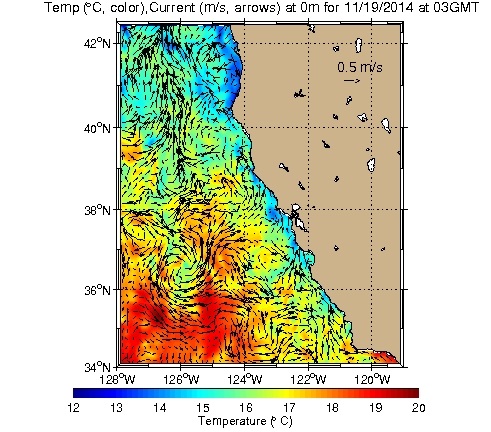FY ’15 NOPP Funding Announcement
Oceanographic Modeling Funding Opportunities
Three new funding opportunities for oceanographic modeling are available through the Office of Naval Research and the National Oceanographic and Partnership Program (NOPP), and are expected to run for three years FY15-FY18. It is anticipated that two or three projects may be supported within each topic area at a level of no more than $500K per year for each multi-investigator proposal. Partnerships between federal, university, and private research sectors are encouraged.

Topic 1: Seamless Forecasting from the Deep Ocean to the Coast
Ocean forecasting is typically driven by global models, however, this spatial resolution may not be accurate enough to understand regional and local processes. Under this topic, projects that promote a better understanding of ocean states at finer scales and enable more accurate coupling between the regional/local and global forecasts will be supported. Regional/local areas where shelf physics, moderate scale topographic physics and non-hydrostatic physics in deep water dominate are of particular interest.
Topic 2: Earth System Prediction Coupled Air-Sea Process Studies and Coupled Data Assimilation
This topic is focused on exploration of suitable approaches towards more representative and consistent initialization of the global ocean and atmospheric meso-synoptic to sub-seasonal forecast models, and supporting coordinated process analysis and numerical studies using recent observational field campaigns that specifically included atmospheric and oceanic observations such as T-PARC/TCS-08, ITOP, DYNAMO, TROPIC, and ASIRI. The objective of this topic is to develop and test new coupled air, ocean, and land and sea ice data assimilation capabilities within the global and regional coupled forecast systems that demonstrate improved skill for phenomena with a strong air-sea dynamical evolution such as polar lows, mid-latitude explosive cyclogenesis, tropical cyclones and tropical intra-seasonal oscillations. This capability will be obtained through advanced development of ESMF compliant data assimilation techniques collaboratively with related work sponsored by NOPP partner Agencies.
Topic 3: Integrating the Hydrological Cycle for improved Coastal and Global Forecasting
The dynamic exchange of water form land to ocean is typically captured in semi-empirical, statistical, or statistical-dynamical systems and historical observations necessary for forecasting, especially at a global scale, are not available. The objective of this topic is to focus on the research, development, and testing of a high-resolution coupled land surface and hydrological modeling capability that demonstrates improved skill for mesoscale domains with large freshwater and coastal features. A data assimilating, high-resolution capability will better address high impact events such as seasonal river levels, seasonal low lying areal flooding, synoptic scale predictability and prediction of extreme events, and mesoscale flash flooding, channel/bank erosion and sediment transport, and coastal trafficability and will establish the foundation necessary for a fully coupled land-ocean system that would include interactions with marine processes, such as fresh-water stream inflow affecting near-coast water density vertical structure and transport of riverine sediment impacting local bathymetry and water clarity.
Proposals are due January 16, 2015 at 1600 EST through grants.gov.


